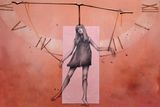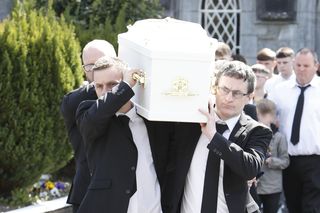Life of an insomniac: 'On really bad days I fantasise about punching my husband, who has slept like a log every night of our 30-year relationship'
As the middle-aged are advised to get more sleep, chronic insomniac Jane Kellock, 53, describes how she'd like nothing more than grabbing eight hours
Jane Kellock hasn't had a good night's sleep since her first son was born 21 years ago thanks to motherhood related anxiety and other psychological factors keeping her awake at night.
If you had happened to glance through the window of house at about 4.30 this morning, this is what you would have seen: a tousle-haired woman at her laptop, tapping out a presentation. By 7am I'd walked the dog, done some admin and scoured the kitchen surfaces.
It's not an untypical night's "sleep"; over the years I've become accustomed to being wide awake as the clock tolls first 3am, then four, then five - by which point I give up trying to hug my pillow and get up to do something useful instead.
Sometimes I am lucky to get two hours' sleep overall, and on the rare occasion that I get five uninterrupted hours I feel so exhilarated, it feels like I have been born again.
Somehow I manage to function, although, apparently, if I listened to the latest advice, it won't be long before I keel into an early grave.
This week we learnt that the UK government is launching a campaign to encourage middle-aged people such as me to get more sleep if we want to boost our health and avoid serious illness (obesity, heart disease and diabetes).
To avoid premature death that those conditions bring, we will be told that we need to value our sleep more and aim for seven to eight hours every night.
Eight hours! Just writing down that figure makes me want to throw every clock in the house out of the window. The last time I got that many hours shut-eye was more than twenty years ago.
Back then, I was a normal sleeper - by which I mean I didn't think about it. I went to bed, and many blissful hours later I would wake up and get on with my day.
That all changed when I had my children - Jack, now 21, and 19-year-old Flo.
As any parent knows, small children and uninterrupted sleep aren't natural bedfellows, and as I had them close together several years passed during which broken nights were the norm as I dealt with teething, night terrors and general toddler neediness.
It was exhausting, but I put it down to a phase that would pass once they were both out of nappies.
It didn't. Instead it seemed to set a new pattern, albeit one where the root cause changed: where once the disruption to my sleep was physical, it turned into something more psychological.
I would find myself jerking awake at three in the morning, my brain whirring with motherhood-related anxieties that I scrolled through to the panic-inducing backdrop of a ticking clock as my husband slumbered peacefully beside me.
Attempts to get back to sleep were futile; the more I obsessed over the diminishing hours of sleep available before the alarm went off, the less I was able to surrender to them.
Thus began the initial, ongoing and largely hopeless attempts to remedy my nocturnal problems. I started with over-the-counter remedies before finally throwing myself on the mercy of the doctor.
He in turn could only offer sleeping tablets, a solution I daren't - and still dare not - embrace, fearing them a slippery slope.
I listened to all the advice, cut down on caffeine and alcohol, and tried to exercise more. I scoured the internet, looking for tips, purchasing lavender spray and sleep-promising orthopaedic pillows.
None of it really made a blind bit of difference, and nor did trying to vary my sleep routine. Whatever time I went to bed - early, late - I either didn't get to sleep at all or woke up at two or 3am, unable to calm my racing brain.
Throughout, I kept putting my faith in the vague notion that the passing of time would somehow, ultimately, bring with it the gift of sleep. Instead, if anything, my insomnia has got worse and now I'm in the full throttle of my mid-life sleep crisis.
As has been recognised by the medical establishment, we over-40s are the group most sleep deprived due to our greater occupational and family demands.
I became fuelled by the worry of caring for teenagers with their erratic, late hours and infuriating inability to respond to texts enquiring after their whereabouts.
Travelling was also the enemy, with its potent mix of strange bedrooms and jetlag: once, on a work trip to New York, I didn't sleep for three days straight, and by dawn was wandering the streets like a hollow-eyed loon looking for somewhere to get a caffeine shot.
That was extreme, but there are plenty of times when my lack of sleep has left me so exhausted I could happily lie down in the middle of a busy road to catch a few winks.
Mid-afternoon, meanwhile, often sees me surrendering to the comforting embrace of a quick-fix chocolate bar to stave off the desire to slump my head on my laptop - one of the reasons, I suspect, that long-term insomnia is linked to an increased risk of diabetes and heart disease.
I do my best, but it's hard to be healthy when you are so tired you can barely switch on the kettle.
On really bad days I fantasise about punching people - including my husband, who has slept like a log pretty much every night of our 30-year relationship - who airily declare how "tired" they are when in fact they were out for the count from midnight until 7am.
Ultimately, however, I've learnt that panicking about my sleepless state is pointless. Far better to get up and do something useful instead of lying there being taunted by your digital clock face.
It's one reason you will often find me cleaning my kitchen cupboards as the dawn chorus unfolds.
Still, while age has made me more sanguine about my plight, it doesn't help being told how important it is to get a good night's kip.
Sleep-shaming, well that's just another thing to worry about - and goodness knows how many of us need any more of those. © The Daily Telegraph
Join the Irish Independent WhatsApp channel
Stay up to date with all the latest news














